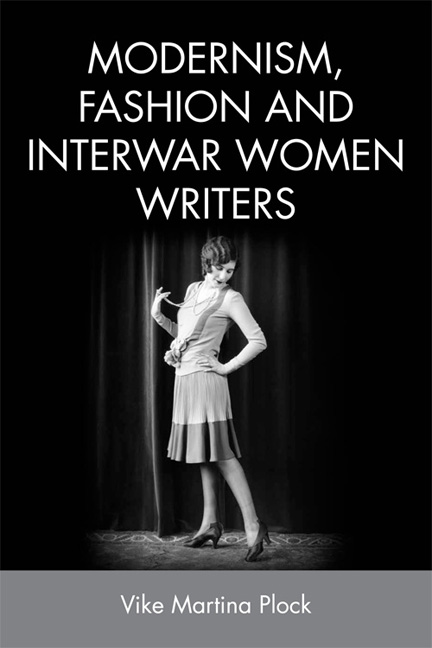Introduction
Published online by Cambridge University Press: 03 January 2018
Summary
This book argues that fashion mattered to anglophone women novelists of the interwar period for two distinct yet interrelated reasons. First, it suggests that fashion provided them with a rich conceptual framework for analysing the complex processes of identity formation in a time of significant social and cultural change. Unlike any other social practice, fashion structures the relationship between individuals and between an individual and adjacent collectives. For this reason, it facilitates the analysis of modern subject identity as a psychological composite at once receptive and defensive towards external influences and pressures. Originality in dress can generate admiration in everyday encounters. But as Mabel Waring, the protagonist of Virginia Woolf's short story ‘The New Dress’ (1924), has to learn the hard way, too much extravagance in clothing ostracises. Because group identity is often maintained by a certain degree of uniformity in dress, sartorial conspicuousness can lead to isolation from communities with which the individual seeks affiliation.
This apparent contradiction between individual expression and community building through the use of clothes is a topic to which my chosen novelists consistently return, and it is the first aim of this book to analyse what aspects of fashion's conceptual apparatus they employ to discuss the ways in which their characters position themselves in relation to new and established gender dynamics that were propagated or challenged in the early decades of the twentieth century. During a time when women's clothing underwent radical changes, the rhetoric provided by the fashion discourse offered these writers a particularly relevant set of thematic clusters to analyse the construction of female subjectivity in a world in which people were relentlessly held up for comparison with others but in which individuals also worried about being swallowed up by the crowds populating the vast metropolitan centres that were the setting of so much of modern fiction. In the work of the included women writers, the analysis of this dialectic between assimilation and differentiation, between conformity and rebellion, facilitates discussions about identity politics. Fashion, as these authors noted, was a social practice that could be easily seized for political ends. And it is these politically motivated appropriations of fashion that are comprehensively discussed and often critiqued in their writing.
- Type
- Chapter
- Information
- Modernism, Fashion and Interwar Women Writers , pp. 1 - 36Publisher: Edinburgh University PressPrint publication year: 2017



